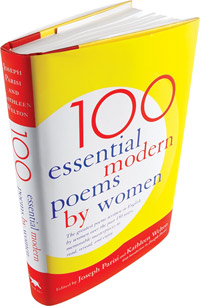 |
100 Essential Modern Poems by Women
Edited by the former Poetry magazine chief Joseph Parisi and the Chicago-based writer Kathleen Welton, with introductions by Parisi.
Ivan R. Dee; $24.95
Elizabeth Bishop, wanting to be judged only and simply as a poet, famously refused to allow her poems to be included in any anthology of women poets. This was a somewhat political stance—challenging the way most men in the American literary culture of her time regarded women as inherently, essentially, less capable of writing great poetry. Bishop’s poems are absent from this anthology, too, because her estate still won’t permit them to appear in such a book.
Fortunately, Joseph Parisi and Kathleen Welton do comment on Bishop’s work in their new anthology, which is not so much a poetry book as a series of brief accounts of 100 poets. Their breezy commentaries seem most comfortable when they are pointing out work inspired by the typically feminine spheres of private life: the family, relationships. Perhaps, then, it’s an unintended double meaning that makes the word “essential” stand out in the title. “Essential” first means “necessary.” But secondly, it suggests that a book of poems by women has something to do with the feminine as an inborn essential quality—an idea about which most readers have grown very skeptical over the last several decades. There’s no discounting that aspects of women’s health and biology are different from men’s, but do biology and even gendered differences in mental responsiveness imply that there is something essentially feminine in poetry by women?
|
THE REVIEWER
Reginald Gibbons is author most recently of a book of poems, Creatures of a Day; he has also published a novel, Sweetbitter, and other works. He teaches writing and literature at Northwestern University, where he is the director of the Center for the Writing Arts. |
While the great Bishop would say no, the excellent Fleur Adcock might say yes. She says, as Parisi relates to us in his introduction, that she has preferred to “write about things in which women are interested: childbirth, family life, relationships. That’s what the function of a female poet is.” Fortunately, Parisi and Welton select some poets who are engaged with the large issues of their times: Emily Dickinson’s religious belief and skepticism; Muriel Rukeyser’s passionate partisanship against fascism in Spain and Germany; the response and resistance to racism and sexism in the work of Audre Lorde and Adrienne Rich; Eavan Boland’s rich formulations against patriarchy in Ireland. When Parisi comments on the last three poets in the book, Carolyn Forché, Rita Dove, and Louise Erdrich, he finally seems to warm to the passion for poetry’s capacity to include history and witness.
Among the missing poets who seem worthy of inclusion is Lorine Niedecker, whose graceful, precise poems chronicle daily, often rural, life in Wisconsin. And Genevieve Taggard, who, though she wrote only a few great poems, achieved greatness in them. And Barbara Guest. And others. Another quibble is the inclusion of some poems that really are not, however you define the term, masterpieces. There are some marvelous poems in this book (especially those by Dickinson, Mina Loy, Elinor Wylie, May Swenson, the Australian Judith Wright), but H.D. is not represented here by her best work, nor Marianne Moore, nor Rukeyser, nor Gwendolyn Brooks, nor some others. A reader for whom this book is a first encounter with poetry might think that on the basis of many of the poems included, maybe poetry doesn’t do as much as she or he thought. But
it does, it does. So if the commentaries and the sample poems send readers to find more poetry by these poets, that will please both the editors—and this reviewer—immensely.
Photography: (Book) Blackbox Studios, Inc., (Gibbons) Marc Hauser



